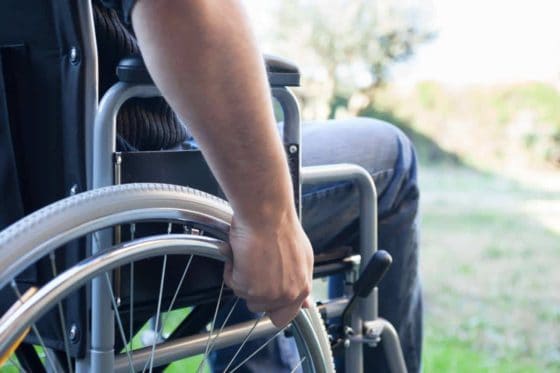Paralysis Lawyers in Chicago, IL
When a car accident causes paralysis due to a spinal cord injury or head injury, Willens & Baez will help you receive the compensation you need and deserve.
Being involved in a serious car accident is a traumatic experience. When a car wreck causes paralysis, it results in a lifetime of changes and expenses.
If a traffic accident causes paralysis due to either a spinal cord injury or head injury, you and your family will need compensation to move forward.
At Willens & Baez we will help you and your family receive the benefits you need and deserve to move forward with your life. Even though monetary compensation cannot undo your injuries or take the pain away, it can help you and your family cope with many of the day-to-day burdens that you will be facing as a result of your catastrophic injury.
Chicago Spinal Cord Injury
Car accidents are the leading cause of spinal cord injuries in the United States. According to the CDC, auto accidents are responsible for 46% of all spinal cord injuries.
The spinal cord is a thick bundle of nerves that run from your brain through the neck and spine. It is part of the central nervous system that transmits signals to and from the brain and body.
If a person’s neck or spine is injured in an accident, the spinal cord can be damaged and may affect the brains ability to transmit signals to the body, causing paralysis.
Much depends on the location of the injury. For instance, if the injury is in the middle of the spine known as the thoracic part of the spine, this can cause paraplegia, which is paralysis of the lower limbs. Whereas an injury in the neck, known as the cervical part of the spine, can result in quadriplegia, paralysis in all four limbs if the body.
Paralysis injuries can be put into the following categories:
- Monoplegia – paralysis of a single area of the body. The most common form is the paralysis of an arm. This can result from either a brain or spinal cord injury.
- Hemiplegia – affects an arm and leg on the same side of the body. This can be caused by a head injury.
- Paraplegia – paralysis below the waist, affecting the legs, hips, and lower body function. This often results from an injury to the cervical vertebra or a fracture to the lumbar vertebrae.
- Quadriplegia – paralysis below the neck, also known as tetraplegia. Often occurs as a result of a cervical injury.
Additionally, when a person suffers from a spinal cord injury, they are either an incomplete spinal cord injury or a complete spinal cord injury. An incomplete spinal cord injury occurs when the injured person can still have some control over the limbs. A complete spinal cord injury occurs when it is fully impaired.
A spinal cord injury resulting in paralysis can occur for a number of reasons, but when it is the result of a serious car accident due to another’s negligence or recklessness, you deserve to receive compensation.
Paralysis – Cost of a Spinal Cord Injury
While every case is unique, the cost of spinal cord injuries resulting in paralysis is generally very high. The average cost of the first year of treatment ranges from $300,000 to $1 million. Lifetime medical care for a quadriplegic can easily cost over $3 million.
For the average person, these figures are seriously overwhelming. In addition, this type of life-changing injury also has emotional costs. The combination can be devastating for both the victim and his or her family.
Chicago Head Injury
In addition to a spinal cord injury, a severe head or brain injury can cause paralysis. The surface of the brain can tear or bruise as it moves around against the skull. This can damage blood vessels and nerves. If part of the brain that controls muscle function is severely damaged, paralysis can occur.
A traumatic brain injury, (TBI) occurs when an external force causes brain dysfunction. It is often the result of a jolt to the head or violent blow. A common example is when a person’s head is jolted forwards and then backward when in a car accident.
Paralysis Symptoms
A person suspected of having either a spinal cord injury or brain injury should seek immediate medical attention. An injury that is less serious can worsen and cause more damage if not treated right away.
So many parts of the body can be affected, but some of the potential symptoms resulting from paralysis include:
- Loss of feeling in arms, legs or feet
- Numbness
- Tingling
- Loss of movement
- Loss of bladder and bowel control
- Change in sexual function
- Respiratory problems, trouble breathing and/or coughing
Once a nerve is damaged beyond repair or severed, it cannot be fixed. There is no type of surgery that can repair or fix it; there is no cure for paralysis.
Types of Paralysis From Serious Car Wrecks
The extent of injury to the spinal cord and the severity of the damage determines the extent of paralysis a person suffers. After a car accident, a victim may experience complete or incomplete paralysis. Complete paralysis means there is no sensation or motor functioning below the injury site. Some car accident victims recover movement and sensation to some extent with the help of various treatments that are available to improve quality of life.
Paraplegia
When the injury occurs below the first thoracic spinal nerve in the rib cage area, paralysis begins from that point down. The legs and abdomen are the most commonly affected areas, causing bladder, bowel, or sexual dysfunction.
Quadriplegia
When the injury occurs above the first thoracic spinal nerve, anywhere from the neck, the trunk, the legs or arms may be affected. Quadriplegia can cause bowel, bladder, and sexual dysfunction and impact the respiratory system. The ability of the person to function depends on whether the quadriplegia or paraplegia is complete or incomplete.
Treatment for Paralysis
Some victims are able to recover mobility and sensation below the site of injury while others require extensive treatment and assistive devices to manage the condition. Complications can develop; for example, bladder dysfunctions may require catheterization or surgery.
Another secondary condition associated with spinal cord injury is deep vein thrombosis (DVT) and other types of blood clots. To prevent blood clots, a doctor may prescribe blood thinners shortly after the injury. Some patients may have respiratory problems and may need a ventilator to breathe and remove secretions.
Besides physical consequences from an accident, there can be many mental and emotions repercussions. Car accident victims who suffer paralysis may also experience psychological problems such as depression. They may need anti-depressants and professional counseling. Surgery may be required to treat nerve damage that has resulted from the paralysis. Most patients require rehabilitation and physical therapy to restore motion and sensation in the affected areas.
Vehicle Accident Related Spinal Injuries
Spinal cord injuries are probably one of the most serious types of injuries that occur when physical trauma causes damage to the spinal column. These injuries affect the brain’s ability to communicate with the rest of the body, and this can lead to various problems for the victim.
Car accidents involve a tremendous amount of physical force which can cause spinal cord injuries. Unfortunately, some victims never recover completely from these injuries. In severe cases, the victim is unable to live independently and needs full-time medical care.
Types of Spinal Cord Injuries
Spinal cord injuries can be complete or incomplete. When a victim suffers an incomplete spinal cord injury, the victim still retains some motor and sensory function below the injury site. However, in case of a complete spinal cord injury, there is no sensory or motor function below the injury site. Even today, most complete spinal cord injuries are still irreversible, and they render victims paralyzed below the injury site. Through rehabilitation some people are able to gain some increased function if the injury was incomplete, but that is often over a long period of time.
Determining Losses in a Spinal Cord Injury Case
It is needless to say that most spinal cord injury victims sustain heavy losses as a result of the injury. These losses can be both economic and non-economic, and include the following:
- Medical expenses
- Cost of medical/assistive devices
- Lost income
- Cost of ongoing care
- Property damage
- Loss of quality of life
- Physical and emotional pain and suffering
It is important to note that you not accept the insurance company’s first offer when it comes to a spinal cord injury. It is important to seek legal advice from an experienced Chicago car wreck lawyer, who can help determine what the case the worth. Often insurance companies will give lower offers to those who do not have an attorney. If you suffer an injury, immediately contact an attorney.
Can I Recover from My Spinal Cord Injury?
As is the case any other type of personal injury, your ability to recover damages depends on whether the accident was caused by someone else’s negligence. Negligence occurs when an individual fails to exercise the degree of care that would ordinarily be used by a reasonable person under similar circumstances. Also, a person can be considered negligent if he/she violates a law that is designed to keep others safe. Some ways in which driver negligence can cause a car accident include:
-
- Speeding
- Distracted driving
- Failure to adequately maintain a vehicle
- Following too closely
- Aggressive driving
- Changing lanes without signaling
- Ignoring stop signs or stoplights
- Failure to yield
- Driving the wrong way on a one-way road
- Impaired driving
It is also worth noting that you can have some fault and still recover. For instance, if you are 20% responsible and the other person is 80% responsible then you can recover 80% of what a jury decides is an appropriate amount. If you are unsure of your fault in the accident, contact an attorney.
Other Negligent Causes Of Paralysis
While motor vehicle crashes may be the first thing we think of as a cause of catastrophic injuries, many other negligent acts can lead to a paralyzing condition. These forms of negligence may not be as attention-grabbing as a car crash, but they can be as devastating to victims. Because of this, we also fight for paralyzed victims of the following:
Slip-and-fall accidents/Premises liability
Slipping, tripping, and falling are not always innocent mistakes. Many times, they are a result of someone’s failure to keep their property safe. When this happens, you may be able to file a “premises liability” claim.
Premises liability is the principle that property owners and managers must keep their premises safe for visitors. This entails detecting and fixing hazardous conditions or warning guests about existing hazardous conditions. For instance, homeowners have the duty to fix broken steps or unstable decks, and restaurants and malls must warn customers of wet spots on the floor.
Slip-and-fall injuries are actually very common. One study from the Johns Hopkins School of Medicine suggests that falls surpass car crashes as a top cause of traumatic spinal cord injuries.
Medical malpractice
Any medical procedure is delicate, but sometimes a crucial mistake may be made that could have been avoided by the doctor. When a medical provider fails to fulfill the standard of care and instead causes a paralyzing injury, this may be a case of medical malpractice.
Paralyzing injuries can result from surgical errors and chiropractic errors. Some patients could also become paralyzed if their debilitating disease is not diagnosed properly or is given the wrong treatment. These are forms of medical malpractice for which victims may be compensated.
Unfortunately, these are not rare or isolated cases. The National Spinal Cord Injury Statistical Center (NSCISC) reports that medical or surgical errors are among the top causes of spine injuries, accounting for 4.6 percent of the cases studied.
Recreational injuries/Sports injuries
We sometimes hear of athletes who sadly become paralyzed because of sports-related injuries. But even non-athletes may suffer these after a disaster in their recreational pastimes. According to the NSCISC, sports and recreation accidents account for 8.2 percent of spinal cord injuries.
Additionally, there is also the risk of a paralyzing head injury. A traumatic brain injury (TBI) during a ball game can lead to paralysis. Even a boat accident or a swimming pool accident may have a similar outcome – and there have been many real-world cases of these.
Complete Spinal Cord Injuries
Catastrophic car accident injuries can have long-term consequences and may leave the victim permanently disabled. One of the most serious injuries that can result from a car accident include spinal cord injuries. Spinal cord injuries are categorized as complete or incomplete. A complete spinal cord injury is the most serious and can be life-altering. While all spinal cord injuries are serious, they are not all the same.
Complete Paraplegia
Complete paraplegia is both permanent and total. Car accident victims who suffer from complete paraplegia lose all of their sensory and motor impulses at the T1 level of the spinal column. They retain full use of their arms and hands after the crash. Any injury to the upper torso, including breathing problems, typically resolve. However, the victim loses sensory and motor function of the:
- bowels
- bladder
- legs
- sexual organs
- feet
Car accidents are one of the most common causes of spinal cord injuries that lead to paraplegia. While it is not possible to completely reverse the condition, appropriate medical care can prevent it from getting worse. Therapies such as occupational therapy and physical therapy can help restore some level of function of the organs and help victims continue to live as independently as possible.
Complete Tetraplegia
Car accident victims who suffer from complete tetraplegia suffer from the same consequences as that of complete paraplegia, but their arms and hands are also paralyzed. Other consequences of complete tetraplegia include:
- inability to move the neck or shoulders
- inability to breathe independently
- inability to speak without assistive devices
The effects of any type of paralysis is devastating. Car accident victims who suffer complete spinal cord injuries require immediate and ongoing medical care for the rest of their life. In many cases, the lifespan of the victim is considerably shortened because of the paralysis, particularly if any of the vital functions such as respiratory function is impaired.
If you or a loved one has suffered a severe injury from a car crash that involved the negligence of another driver, contact an attorney. While the injury often cannot be reversed, we can help ensure you or your loved one receives appropriate compensation for the future.
Chicago Car Injury Lawyer
If your catastrophic injury has been caused by the recklessness or negligence of another person, you can file a personal injury claim. There are generally large financial implications following a spinal cord injury, causing paralysis. For this reason, one of the most important aspects of such a claim is determining its value.
When it comes to personal injury cases, we don’t limit ourselves in what we cover. We are dedicated to helping you through this difficult time. We have years of experience covering many forms of personal injury.












